
|
Evacuee Cinema: Bombay and Lahore in Partition Transit, 1940-1960
Hardback
Main Details
| Title |
Evacuee Cinema: Bombay and Lahore in Partition Transit, 1940-1960
|
| Authors and Contributors |
By (author) Salma Siddique
|
| Series | Metamorphoses of the Political: Multidisciplinary Approaches |
|---|
| Physical Properties |
| Format:Hardback | | Pages:276 | | Dimensions(mm): Height 236,Width 162 |
|
| Category/Genre | Films and cinema
Asian and Middle Eastern history |
|---|
| ISBN/Barcode |
9781009151207
|
| Classifications | Dewey:384.80954 |
|---|
| Audience | | Postgraduate, Research & Scholarly | |
|---|
| Illustrations |
Worked examples or Exercises
|
|
Publishing Details |
| Publisher |
Cambridge University Press
|
| Imprint |
Cambridge University Press
|
| NZ Release Date |
31 March 2023 |
| Publication Country |
United Kingdom
|
Description
This new history of partition and South Asian cinema is narrated through the careers of emigre film personnel, as well as through the distinctive genres and ancillary ventures that accompanied the aftershocks of partition. Moving beyond arguments about social contingency and political intent, the book suggests that the creative energies, production and subsequent circulation of popular cinema can offer fresh insights into partition. Pointing to regional connections across national boundaries, this book asserts that the cinemas of India and Pakistan must be explored in tandem to uncover the legacy of partition for the culture industries of the region, one that is not hewn out of national erasures. The leitmotifs of emigre personnel, gossip and satire in film print culture, the partisan repertoire of a theatre company, the film genres of the Muslim social, romantic comedies and charba (remakes), and the unruly film archives of postcolonial nation-states, when accessed through the lens of a divisive decolonization, reveal the parallaxes and confabulations of the 'national' on both sides.
Author Biography
Salma Siddique is a media historian and filmmaker by training. Born in Maiduguri, Nigeria, she grew up in Aligarh and New Delhi in India. She completed her PhD at University of Westminster, London and has been researching and teaching film and media in Germany since 2016.
Reviews'A brilliantly original study of the links between India's and Pakistan's film industries that puts into question the role of partition, war and nationalism in the cultural history of South Asia.' Faisal Devji, University of Oxford 'Unearthing stories of the displaced persons who transformed Bombay and Lahore into national film hubs, Salma Siddique brilliantly refutes the notion that amnesia and silence characterised their film industries' response to partition. Delving into popular, archival and private records, Evacuee Cinema offers breathtaking insight into the frenetic world of film stars, crews, companies and theatres altering their creative trajectories to adapt to cataclysmic times. We owe a large debt of gratitude to Siddique for this riveting and immersive account of emigre film personnel whose paths crossed and recrossed the increasing political distance and hostilities between India and Pakistan during the long partition. An indispensable book that reminds us, powerfully, how two vibrant centres of film production were born from the work, life, privation and imagination of migrants and evacuees.' Priya Jaikumar, Author of Where Histories Reside: India as Filmed Space (2019) 'This is a pioneering study of the entangled histories of Indian and Pakistani cinema. Analysing the film industries in Bombay and Lahore in the run-up to the partition of colonial India and in the years after, Salma Siddique has done groundbreaking work. The book showcases innovative research on key genres such as the Muslim social film and the adaptation of Hollywood genres such as 'screwball', draws attention to the remarkable charba films that remade Bombay films through a Pakistani lens, and casts light on the ambiguities of Prithviraj Kapoor's progressive theatre practices. Evacuee Cinema is based on careful research in a range of archives. It is a compelling, indeed indispensable work that suspends national historical approaches to capture the complex interweaving and separating out of cultural forms and practices.' Ravi Vasudevan, Centre for the Study of Developing Societies
|